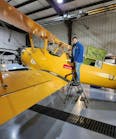Total accidents and the number of fatal accidents for the U.S. civil helicopter industry remained flat during 2019, but the second half of the year reflected fewer accidents (69 vs. 53) and fewer fatal accidents (15 vs. 9) compared to the first six months. The annual numbers also remained below accident totals from five and six years ago.
Preliminary data shows 122 total U.S. helicopter accidents in 2019 compared to 121 accidents the year before. There also were 24 fatal accidents in 2019 compared to the same total in 2018. The total accident rate and fatal accident rate (accidents per 100,000 flight hours) for 2019 will be determined next month.
Total U.S. Accidents
2019: 122 accidents, 24 fatal accidents, 51 fatalities – 16 percent decrease in accidents
First half of 2019: 69 accidents, 15 fatal accidents, 27 fatalities compared to 2013
Second half of 2019: 53 accidents, 9 fatal accidents, 24 fatalities
2018: 121 accidents, 24 fatal accidents, 55 fatalities
2017: 123 accidents, 20 fatal accidents, 34 fatalities
2016: 108 accidents, 17 fatal accidents, 29 fatalities
2015: 121 accidents, 17 fatal accidents, 28 fatalities
2014: 138 accidents, 21 fatal accidents, 37 fatalities
2013: 146 accidents, 30 fatal accidents, 62 fatalities
Even though year-to-year data is static, long-term progress in accident reduction remains positive. Over the past two decades, the U.S. helicopter fatal accident rate has been cut in half, from 1.27 fatal accidents per 100,000 flight hours to 0.63. (based on a five-year rolling average)
Initiatives and Solutions
To reduce the number of fatal accidents even more, the U.S. Helicopter Safety Team (www.USHST.org) has been working diligently on developing safety enhancements based on the accidents we have analyzed. Many of the initiatives are now advancing forward.
- During 2019, the USHST developed and promoted a white paper showing how UAS (drones) can supplement and support manned helicopters in high-risk operations and environments.
- Also during 2019, the team released two new airmanship bulletins on the Vortex Ring State and on Power Available Limitations.
- The USHST released a best practices document and a fact sheet offering guidelines for preflight inspections and final walk-arounds.
- The USHST is collaborating with the FAA and the GAJSC to promote a new reference tool for pilots about how impairment can be caused by certain over-the-counter medications.
- We continue to provide face-to-face safety education and safety material distribution at industry events. We provide thousands of free safety documents to pilots, mechanics and instructors from our booth at Heli-Expo. We offered 21 workshops as part of the Heli-Expo Safety Challenge and recently, we participated in the CHC Safety Summit in Dallas and at the National Agricultural Aviation Association convention in Orlando.
- A USHST team also is completing work on a Best Practices Guide regarding the use of simulation to rehearse at-risk scenarios and develop safe decision-making.
- Another USHST team is completing research papers providing extensive safety information for pilots about enhanced vision systems and stability augmentation systems.
- In order to reinforce a culture of safety among pilots within the helicopter community, the USHST is working with the FAASTeam to present a nationwide series of “Go Local” workshops. The two-hour session dives deeply into one specific helicopter accident, discusses the tragedy of lost lives, and helps pilots see that many operational decisions are not black and white choices. Workshops have been hosted by FAASTeam managers in Phoenix and Fort Worth and we have FAASTeam commitments for 2020 in these 12 cities: Little Rock, Milwaukee, Memphis, Oakland, Salt Lake City, Baton Rouge, Denver, Houston, Columbia SC, Greensboro NC, Washington DC, and Portland, Ore.
More information about the USHST, the International Helicopter Safety Foundation, its reports, safety tools, Reel Safety audio-visual presentations, and YouTube safety videos can be obtained at its web site at www.IHSF.aero and on the IHSF Facebook page.
